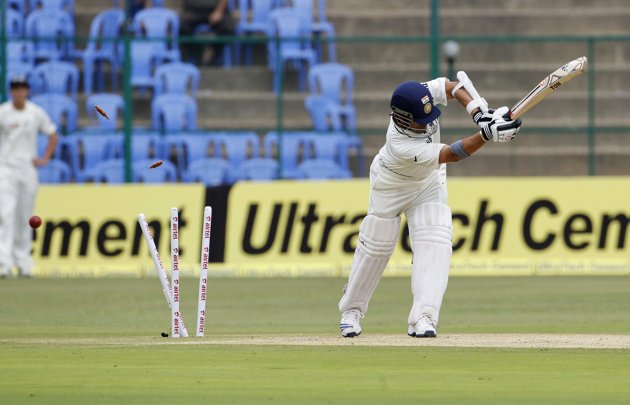
It is time to question the perspective that seems to have dictated the decision of the national selectors thus far in handling Team India’s transitional phase. Is it enough to take the horse to the water? Or do you want to teach it to drink? Thus far, the selectors seem to have preferred the second option.
Vulnerable as India’s young cubs are supposed to hostile opponents, and windy or bouncy conditions, the selectors have sought to protect them with the nurturing hand of experience. After all, goes the argument, the three stalwarts Rahul Dravid, VVS Laxman and Sachin Tendulkar - of whom only the last is still active in Test cricket - have amazing track records and broke new ground in India’s overseas campaigns So who better than them to teach the youngsters how it is done?
The results since the summer of 2011: unprecedented whitewashes in England and Australia and a shaky, not-out-of-the-woods-yet performance against New Zealand. In the meantime, Dravid and Laxman made up their minds and decided to leave the stage for good. We hear that Tendulkar has no such plans for the moment.
The question is: What plans do the selectors have for Tendulkar? Or, would they prefer to abdicate the responsibility of planning Tendulkar’s future, leaving him to eventually face the wrath of the public when even they grow weary of his fading form? After all, abdicating the responsibility of decision making is something the Government of India has specialised in. Given that said Government is enjoying its second term in power, perhaps the selectors find therein a great example to follow.
That brings us to the bone of contention in the Tendulkar debate. Since the summer of 2011 (that is, after his wonderful trip to South Africa), Tendulkar averages 35 in 23 innings. Some would argue that strongly suggests a lean patch while others would not be so sure. But I believe both sides can agree an average of 35 is not exactly glorious. Further, we’ve got to believe that our young cubs can score at least 30-odd on average in Test cricket!
And it is this aspect of the experience vs youth debate that bothers me. If we don’t believe India’s younger generation of batsmen can produce even such an unflattering level of performance, maybe we should all just stop watching the Indian team because it’s a hopeless prospect.
The argument propounded in favour of experience is that left to fend for themselves, the youngsters would fail spectacularly and India would sink to disastrous defeats. But (a) there’s not much lower to sink than the low 30s for a middle-order batsman and (b) it doesn’t get more disastrous than 0-8.
At Adelaide and at Bangalore, with the rest of the batting collapsing around him, it was Virat Kohli, so reviled for his ‘attitude’, who stepped up and held the innings together It may take him years to get anywhere close to the phenomenal records of Tendulkar or Dravid, but the formbook is firmly in his favour. The likes of Ajinkya Rahane are waiting in the wings in the meantime. Would giving them the chance to score even a few low 20s such a big risk when the returns from experience aren’t that much more lustrous?
I will not comment on the reasons for Tendulkar’s string of low scores because that is not my subject. But I am keenly interested to know what exactly are the selectors waiting for - Godot? One hopes the selectors are not in the game of gaining popularity votes from the audience and the media. It is their responsibility to make decisions that further the progress of the Indian cricket team in the respective formats.
While one as legendary as Tendulkar has earned the right to sign off on his terms, there comes a time when the selectors decide they have waited long enough and take a decision on his behalf. They are fully entitled to do so, if they believe that is the case, as is Tendulkar to keep playing as long as he is deemed eligible by the selectors.
Let us hope the new selection committee shows some spine and doesn’t let down Team India as badly as the affable Kris Srikkanth committee did.






Comments
Add new comment